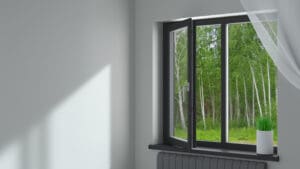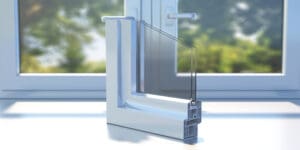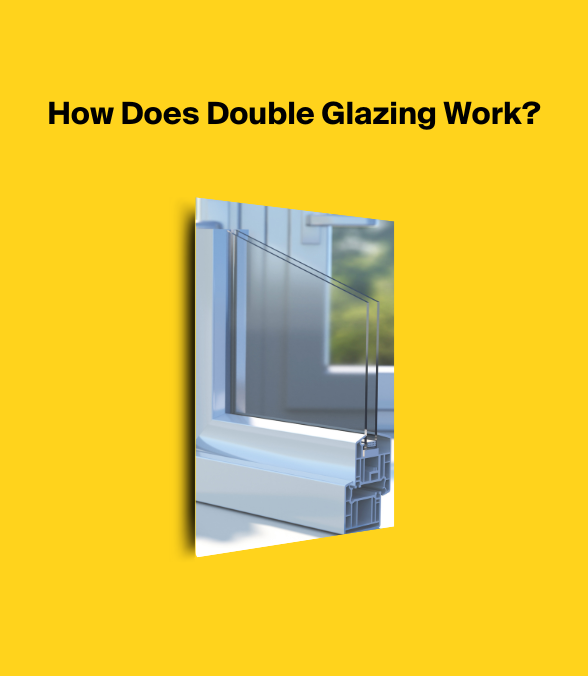What is Double Glazing?
If you’re wondering, “How does double glazing work?” you’re looking for info about their efficient thermal and noise-insulating capabilities.
The secret lies in the two glass panels separated by a gap filled with a gas like argon to form an effective barrier against external temperatures and sounds. This article dives into the science of double glazing and examines the practical advantages it brings to your living spaces.

Build your window today!
Get a Quote
All About How Double Glazing Works - Overview

- Double glazing windows consist of two panes of glass separated by a spacer and sealed with an insulating argon gas layer, reducing heat loss by up to 64% compared to single glazing and offering additional benefits like noise reduction, UV protection and increased security.
- Energy efficiency is a significant benefit of double glazing windows, with potential annual energy cost savings of £100-£150 for an average detached household, along with noise reduction capabilities that can decrease sound by up to 35 decibels.
- Various types of glass can be used in double glazing, including Tempered glass for increased durability and Laminated glass for safety, while frames and glass with low U-values and higher energy ratings enhance insulation and compliance with building regulations.
Read more - How much does double glazing cost?
Understanding Double Glazing Windows
To explain double glazing science in the simplest terms, double glazing involves the use of two separate panes of glass with a layer of argon gas in between. This construction is a significant shift from single-glazed windows that consist of a single pane of glass. But what makes double glazing so special?
A key aspect of how double glazing windows work is their ability to reduce heat loss through radiation. They absorb heat from the room and transmit it through conduction and convection to the cooler outside pane. This process creates a barrier against the cold and allows beneficial solar gain.
The result? A thermal insulation benefit that can enhance the warmth of a home by up to 64%, significantly helping to retain heat and thus making the room more energy-efficient.
The benefits of double glazing windows include:
- Thermal insulation
- Noise reduction
- UV protection
- Increased security
We will delve deeper into these benefits later in this blog post.
Components of Double Glazing Windows
A double-glazed window, also known as an insulated glass unit (IGU), primarily consists of glass panes. But what separates these panes, and what keeps them in place? Enter spacer bars. These vital components in double-glazing windows:
- Separate the panes of glass, creating a cavity that enhances thermal insulation
- Use ‘warm edge’ technology to improve the performance of the window
- Space and seal the glass panes around the perimeter of the window
Spacer bars are instrumental in ensuring the effectiveness of double-glazed windows.
But the cavity they create is not left empty. It is filled with argon gas, known for its heat retention abilities and its contribution to enhancing thermal insulation.
Behind Double Glazing Science
Double glazing works to reduce heat transfer by trapping an insulating argon gas between two panes of glass, creating a thermal barrier.
This insulating effect of double glazing can minimise heat loss by up to 50% when compared to single-pane windows. Additionally, double glazing reduces condensation, providing further benefits to homeowners.
Apart from aiding in insulation, the gas layer in double glazing, along with the extra pane of glass, contributes to:
- Noise reduction inside a building
- Preventing condensation
- Enhancing comfort by keeping the interior glass surface closer to room temperature, thereby mitigating moisture buildup.
Benefits of Double Glazing Windows

The benefits of double glazing windows are manifold. Apart from significantly improving home comfort by enhancing energy efficiency and reducing noise, they offer additional benefits such as UV protection and security.
By installing double-glazed windows, you also improve insulation. This means that you keep warm air inside and cold air outside, which contributes to lower energy bills.
Not only that, but the design of double-glazed windows, which includes an extra layer of glass and gas, effectively reduces noise pollution from outside sources.
Moreover, double-glazed windows offer several benefits:
- They reduce the number of UV rays entering a property, minimising glare and protecting furniture and flooring from fading and discolouration.
- They have a lower maintenance requirement because they are less prone to condensation compared to single-glazed windows.
- They enhance the appearance of properties by offering a range of design options.
- They add aesthetic value due to their cleaner and newer look.
Finally, enhanced security is another notable benefit, as the dual layers of glass make double-glazed windows more difficult for intruders to break through.
Read more - How much do new windows cost?
Energy Efficiency and Cost Savings
One of the most significant benefits of double glazing is its energy efficiency. Double glazing can reduce window heat loss by 74% compared to single glazing through the dual layers of glass and insulative air or gas in between.
With double glazing, an average detached household can save between £105-£155 annually on energy costs, while also reducing CO2 emissions significantly. This energy efficiency is heightened by the use of noble gases like argon, krypton, or xenon, as well as warm edge spacer bars instead of aluminium, which contribute to enhanced insulation and reduced heat transfer.
Moreover, a lower U-value, which indicates better window insulation, is key for maintaining higher indoor temperatures, energy savings, and preventing issues like surface mould.

Build your window today!
Get a Quote
Noise Reduction
Another key benefit of double-glazed windows is their noise-reduction capability. They can reduce sound by up to 65%, which equates to a noise reduction of about 35 decibels.
The two layers of glass in double-glazed windows absorb sound waves, with each layer diminishing the noise further before it enters the interior space. This makes double glazing particularly effective in reducing traffic noise, making it suitable for homes near roads, train stations, or airports, as well as for areas with high volumes of traffic and noise pollution.
The soundproofing abilities of double glazed windows are further improved when the space between the glass panes is filled with argon gas, which minimises the chance of clouding due to reduced moisture content.
Enhanced Security
Double-glazed windows provide enhanced security. They have:
- Two panes of glass sealed together in a double glazed unit, which provides added strength and durability over single-pane windows
- Advanced locking systems, such as steel reinforcing, shoot bolt locks, high security hinges, and internal glazing which deters external de-glazing
- Safety glass types like tempered glass, which crumbles without sharp edges, and laminated glass, which holds together when shattered
All of these features contribute to the secure design of double-glazed windows.
The combination of double-glazing’s strong construction, secure locking mechanisms, and use of safety glass culminates in a significant enhancement in home security, making them difficult to breach.
Types of Glass Used in Double Glazing Windows
While we’ve touched upon the layers of glass used in double glazing, it’s worth delving deeper into the types of glass used. Annealed or Float glass, referred to as Ordinary Glass, is the most common type used in double glazing, providing a basic level of durability and insulation.
However, there are also other types of glass used in double glazing. Tempered glass, also known as toughened glass, offers increased durability compared to annealed glass through a thermal treatment process, making it safer and four times stronger.
The laminated glass features two or more glass-separated layers bonded with a durable plastic interlayer, enhancing breakage resistance and safety.
Other options include:
- Low-E Energy Saving Glass, also known as low e glass, which reflects interior heat back into the room
- Self-cleaning glass, which uses the sun and rain to clean dirt and grime
- Solar Control Glass, which filters light, controlling heat gain and maintaining cooler room temperatures during sunny periods
- Vacuum glazing or LandVac, which achieves high energy efficiency and soundproofing while maintaining a slim profile, suitable for modern double glazing applications.
Factors to Consider When Choosing Double Glazing Windows
When deciding to install double glazing windows, there are a few key factors to consider. For optimal energy efficiency, it is essential to select double-glazing windows with a low U value, as it measures how well the window prevents heat from escaping.
Another factor to consider is the energy rating, developed by the British Fenestration Rating Council, which ranges from A++ to E, with a minimum rating of C required by law for new installations in the UK.
Your choice of frame material should consider the architectural style of your home, with wood suiting traditional designs and aluminium fitting modern aesthetics. New building regulations mandate the use of low-energy glass with argon-fill and warm edge spacer bars for improved insulation, replacing traditional aluminium spacer bars.
You should also look at the price of not just one window, but multiple windows if you are planning to get double glazed windows all over your house. For example, the cost of double glazing a 3 bed house in the UK is around between £4,100 - £7,400.
Installation and Maintenance of Double Glazing Windows

The installation of double glazed windows involves the following steps:
- Prepare the site by ensuring safety.
- Remove the old windows.
- Fit the new frames.
- Secure the glass.
- Seal the exteriors.
- Conduct a quality check.
- Thoroughly clean up the site.
- Demonstrate the new window operations.
This completes the installation process.
As far as maintenance is concerned, it involves:
- Regular cleaning
- Inspecting and maintaining seals and moving parts
- Taking preventive measures to avoid issues like misting
- Some double glazed windows even include maintenance-free internal blinds for better solar control, contributing to the improvement in property value.
Common Issues and Solutions with Double Glazing Windows
Like any other home improvement, double glazing windows can also have some issues. One common issue is blown double glazing seals, which can cause misting, characterised by moisture buildup between panes, leading to a foggy appearance.
Professional window repair for misted double glazing involves:
- Disassembly
- Cleaning of panes
- Seal replacement
- Reassembly
By following these steps, you can ensure the efficiency of your replacement windows and maintain the benefits of double glazing.
Other common issues include changes in temperature causing double-glazing frames to expand or contract, causing opening and closing difficulties. Oiling mechanisms, hinges, handles, and contact points can help alleviate sticking issues in double-glazed windows and doors.
Problems with broken or stiff locks can be addressed by oiling a stiff lock mechanism or replacing the lock.

Build your window today!
Get a Quote
Comparing Double Glazing with Triple Glazing and Secondary Glazing

While double glazing offers numerous benefits, it’s not the only choice out there. You might also consider triple glazing and secondary glazing.
Triple glazing includes three panes of glass with gases like argon or krypton for enhanced insulation, offering lower Ug values and less heat loss compared to double glazing.
However, the initial cost of installing triple glazing is higher than double glazing, but it may result in more substantial long-term savings, particularly in well-insulated homes.
On the other hand, secondary glazing offers the following benefits:
- It is less expensive than double glazing
- It allows for energy savings without extensive renovation
- It preserves the original look of properties, which is important for historic buildings or where double glazing is not an option.
Triple glazing, due to its additional glass layer, offers enhanced security compared to double-glazed windows. However, secondary glazing, with variations like magnetic or hinged units, can impact the aesthetics and ease of cleaning of windows, as improper installation may reduce its effectiveness.
What is Double Glazed Windows - Final Thoughts
To summarise, double glazing windows offer numerous benefits, from enhanced energy efficiency and noise reduction to increased security. The type of glass, the frame material, and the energy rating are huge factors to consider.
While there are alternative options like triple glazing and secondary glazing, double glazing windows stand as a reliable choice for most homeowners due to their balance of cost, effectiveness, and versatility.
Now that you know what double glazing is and how double glazing works, you can make a decision on what type of glazing you need in your windows and doors, to make them as elegant, yet secure and energy efficient as possible in your home.
Frequently Asked Questions
Does secondary glazing work?
Yes - secondary glazing does work and provides a higher level of thermal efficiency, protection and soundproofing. Double glazing is fairly standard in most UK homes nowadays due to the benefits it provides over single glazing.
What are the negatives of double glazed windows?
The negatives of double glazed windows include trapping heat, lack of repairability, potential mismatch with older architectural styles, and higher initial costs. Therefore, it's important to consider these factors before investing in double glazed windows.
How do double glazed windows work?
Double glazed windows work and insulate by using a thermal cushion and gas insulation to minimise heat loss through the sealed unit. When cold air hits the glass pane, the temperature is transferred to the gas layer, helping to maintain internal warmth.
What is the double glazing method?
The double glazing method involves trapping a layer of air between two panes of glass, which reduces heat loss across the window by preventing air circulation and lessening convection.
How does double glazing save energy?
Double glazing saves energy by reducing heat loss, as mentioned above, due to the trapped layer of air between the glass panes. With reduced heat loss, you won't have to use as much energy and electricity trying to keep your property warm, as it should stay warm for longer.
This also means you can save on your energy bills, as you won't be using as much energy or as often as before double glazing.
What are the benefits of double glazing windows?
Double-glazing windows offer multiple benefits, including improved energy efficiency, noise reduction, UV protection, and enhanced security, ultimately enhancing home comfort.

Build your window today!
Get a Quote









